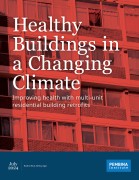Low-carbon buildings are both a climate mitigation and a wealth creation opportunity — and Canada is ready to lead.
In this blueprint, Équiterre and the Pembina Institute offer a suite of ambitious and practical policies aimed at ensuring rapid implementation of the building commitments outlined in the Pan-Canadian Framework on Clean Growth and Climate Change.
A. National targets
A discussion on the need for explicit targets for the buildings sector, in a bid to signal the level of ambition required at all levels of government, and to align initiatives across levels of government.
B. Core policies
Energy codes and certification hub
The federal government can become an energy codes and certification hub by updating its model code adoption process in favour of incentives for compliance promotion and enforcement, by supporting net-zero contractor certification schemes, and by adjusting tax incentives.
Buildings data strategy
The federal government can develop a buildings data strategy, including a public, regular Canada-wide energy efficiency potential study, a suite of key public databases of projects, and a neutral scorecard of provincial and municipal action against key metrics. This data may be used to support efforts at all levels of government, as well as serve as a baseline to assess progress and allocate funding.
Buildings financing initiative
The federal government can launch a buildings financing initiative, including a loan guarantee pilot program, a seed capital program to support local financing initiatives, an aggregation function of financing products within the Canada Infrastructure Bank, and funding support for efforts to standardize energy efficiency project financing on a national scale.
Green buildings transfer funding
Through the deployment of its Low-Carbon Economy Fund and other transfer funding arrangements, the federal government can launch a green buildings transfer funding scheme with provinces, and attach “green strings” to its infrastructure funding commitments. The funding should be contingent on progress against Pan-Canadian Framework-related metrics and the national targets set out in Part A.
C. Supporting policies
In addition to the core policies, the federal government can foster progress through a suite of supporting policies, including fiscal measures, international cooperation via IRENA, and the development of a network of low-carbon demonstration buildings in major Canadian cities.
Combined with the commitments outlined in the Pan-Canadian Framework and Budgets 2016 and 2017, these policies and programs will place the building sector at the core of the federal government’s clean growth, skills training and innovation agenda.








